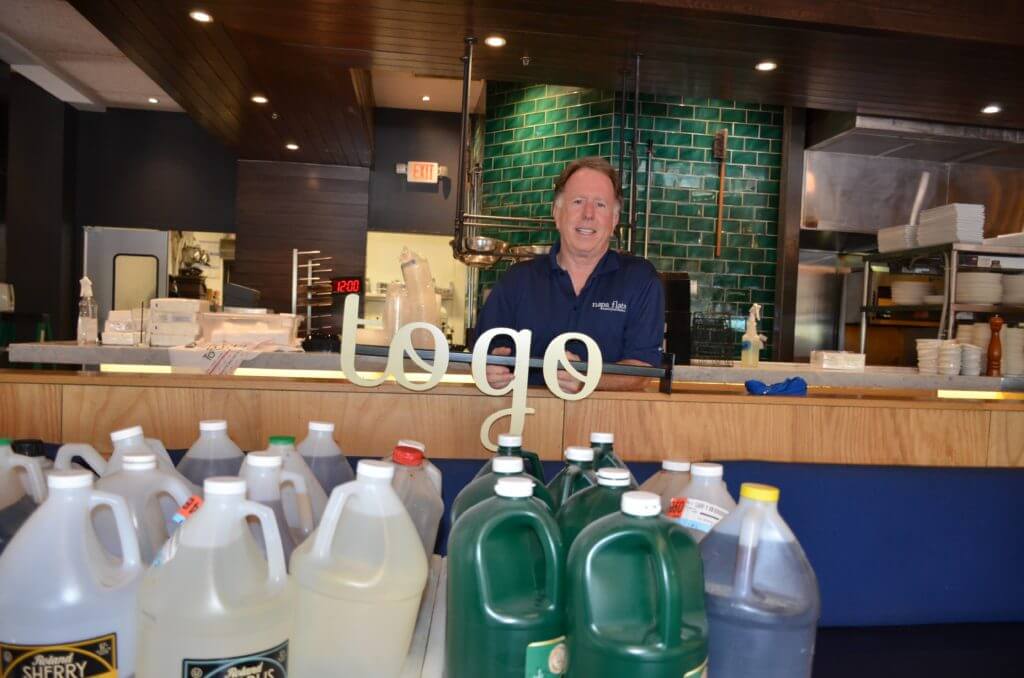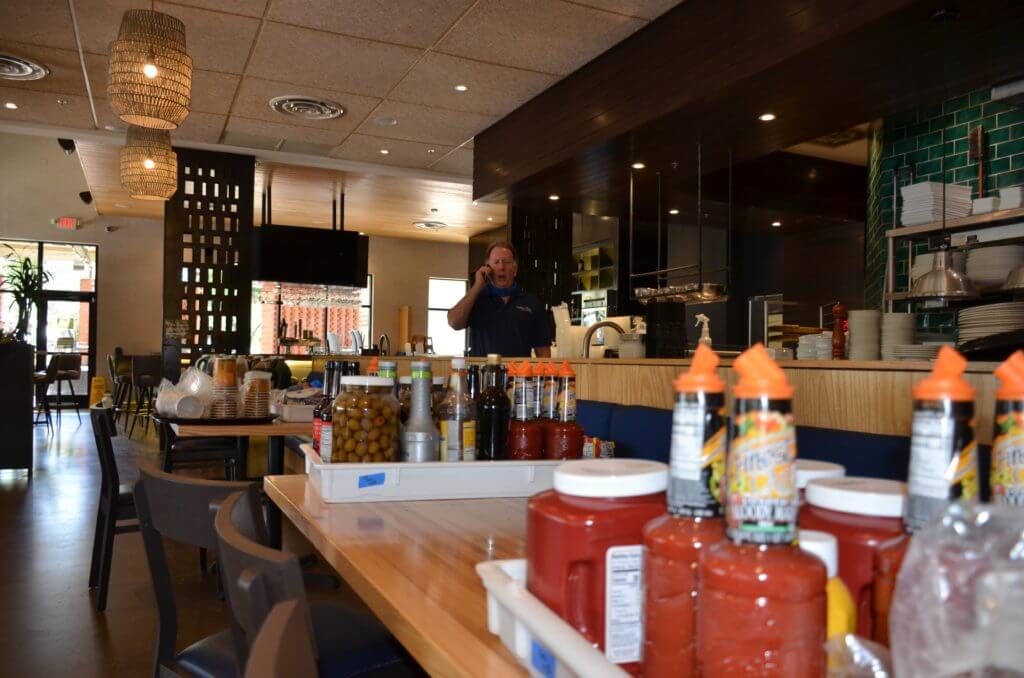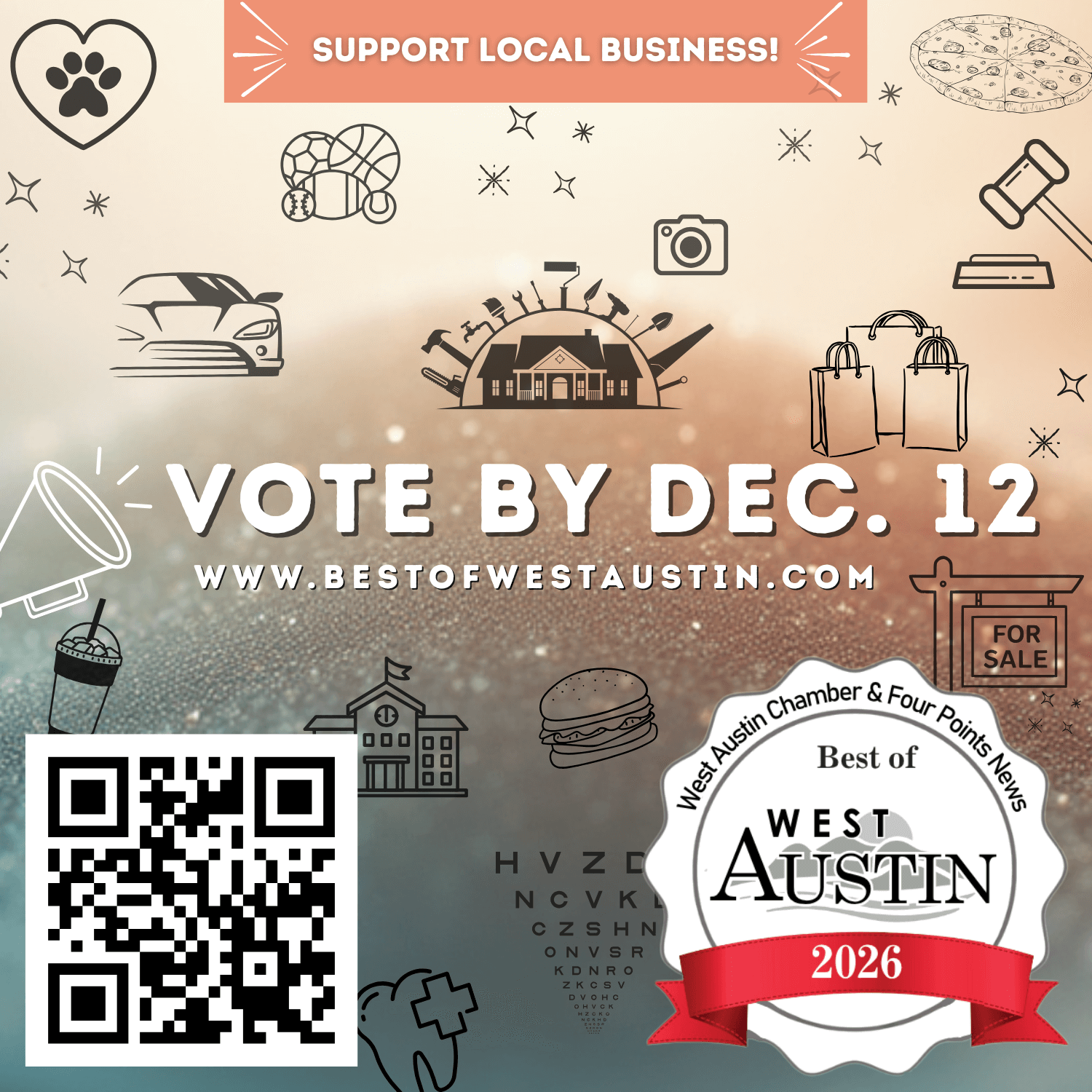
By LYNETTE HAALAND, Four Points News
Tom Kenney rolled up his sleeves last week to start the intimidating task of cleaning out the Napa Flats Wood-Fired Kitchen after it closed for good on Aug. 1.
Kenney was matter-of-fact about the stark reality of shutting down his restaurant as he went about his work, directing the kitchen staff and boxing up bottles of olive oil and cooking wines, cans of tomato sauce and stacks of plates.
“We were losing, if you put in all the rents and the fixed costs, tens of thousands (of dollars) a month. And that’s not long-term sustainable,” said Kenney, who opened Napa Flats nearly five years ago at Trails at 620. He had some 50 employees before COVID-19 changed everything.
Kenney — who operates two other Napa Flats in College Station and Tulsa, Okla. and co-founded Grub Burger Bar — shared reasons behind shutting the doors permanently only in Austin.
“It was going good up until February. We were up in sales over the prior year,” he said. His manager and staff helped develop the business and it was growing.
But then the COVID-19 pandemic hit and the last five months have been unsustainable.
Napa Flats tried to pivot and focus on just to-go orders in the second week of March when the statewide shutdown mandates were enforced and closed all non-essential businesses.
“But you’re only busy for a few hours a day (with to-gos),” Kenney said.
During the initial shutdown, sales dropped by about 90%. Over the past couple months, sales have been down 40% to 50%, he said.
Lunches
Lunch was a third of its sales and have drastically dropped since mid March. Many area offices had to shutdown and are not yet back open to full capacity, many just have a skeleton staff now.
“There’s no lunch business out here any more,” Kenney said.
Paycheck Protection
Kenney applied for the Paycheck Protection Program government loan and got it, like so many other small businesses. But the PPP was not initially designed for restaurants which have a unique business model, he said.
Many times restaurateurs will buy food for next week with the previous week’s sales. When the shutdown hit, Napa Flats, like all other restaurants, was left with a lot of perishable inventory. Kenney was able to donate a large portion of it to charity.
He said restaurants typically need to be at 75% capacity at lunch and dinner times to be successful.
“No restaurant P&L is based on only being at 50% with the high rents,” Kenney added. “We’re down 40% now in sales. It’s not sustainable to move forward.”
“That (PPP) money is no longer in the bank,” he said.
Consumers
“When we opened up again only at 50% capacity, it didn’t matter what the government mandated but more what consumers felt,” Kenney said.
So although they were allowed to be open for more customers, consumer confidence was shaken.
“We need to restore confidence in the consumer,” he said.
Bills don’t stop
Even though there is a shutdown and a slowdown, the bills don’t stop. Kenney said they paid employees and vendors and are negotiating with the landlord.
The restaurant accumulated debt from being behind on rent.
Landlords, in general, are in a bad position, he said. “Places like the Domain will be in the hole for a while.”
Additionally, prior to the pandemic, the Trails at 620 shopping center never took off like it was expected to, he said, and lack of visibility from RM 620 also contributed to challenges they faced.
“Eventually we have to practice the law of holes. When you’re in a hole, stop digging,” Kenney said. “That’s why we’ve decided to close. There was not an immediate pathway forward.”
Staffing
At peak, Napa Flats had 50 staffers, most who worked part-time and a third who were full-time.
The shutdown and now the mandates of the pandemic are still affecting employees.
“It’s dried up any hope for staffing,” Kenney said. “Many workers make more or the same not coming to work (with unemployment).”
This on top of the fact that compared to other markets, Austin has always been a challenging labor market, he added.
Anytime Napa Flats had a service issue it was related to not having the right number of staff on the floor, he said. “We’d give them (the wait staff) bigger sections than they like because one person didn’t show.”
Many of the wait staff were students in the Four Points area who had very busy school schedules and would only prefer to work two days a week. Napa Flats was a first job for many. Although the eatery supported the students and was patient with them, it was challenging at times because the job required good discipline and time management, Kenney said.
He added that at least five other restaurants have called him, offering jobs to his staff since he announced the closing.
Independents
“Independent restaurants have a tough time. We held on for five months,” Kenney said. “Independent restaurants are hardest hit and don’t have capital to sustain a long shutdown.”
“I write a check to put (money) in. I don’t have any more money to write a check and pay the bills (at this location),” he added.
Napa Flats is a family-run business and Kenney and his wife live in Austin.They raised their children here. He developed the Napa Flats concept with business partner Jimmy Loup. The same duo created Grub Burger Bar in College Station, and that chain has expanded to Houston, Dallas, San Diego, and many more markets.
The other two Napa Flats did not “fall off as much” as Austin did, he said. College Station is down in sales but doing ok considering all of the factors.
Kenney worries about other restaurateurs and his other sites. “September through October are the dark days of restaurants. We have no idea.”
Community
Kenney announced the Austin Napa Flats closure on July 28 on Facebook.
“The outpouring from the community has been phenomenal. Comments from our email list have been very supportive,” Kenney said.
He said the reality of closing has been hard. The local staff enjoyed seeing regular customers and watching kids grow up over the years.
Many customers came in to eat in the final days and there were lots of to-go orders. They actually had a hard time keeping up, especially Friday when it was non-stop.
“On one hand it was frustrating, we were so overwhelmed with the community trying to support us as we were going out the door,” Kenney said.
Small business
“Small businesses are holding on by threads,” Kenney said.
Over the past week, he has talked with other business owners who are also struggling.
“Five others have come in to talk to me. Everyone is curious about the pathway forward,” he said.
Places like exercise studios and health clubs still have rent to pay but members are hesitant during the pandemic.
“What’s the answer? Find a cure, find that vaccine quick,” he added.
Looking ahead
Kenney is optimistic about the future that this will end in the months ahead.
“Everything’ll come back,” he said. “Long term, we’ll get through this and survive. Out of these ashes of despair will come new restaurants and new real estate deals. There will be opportunities for entrepreneurs to come back in.”


